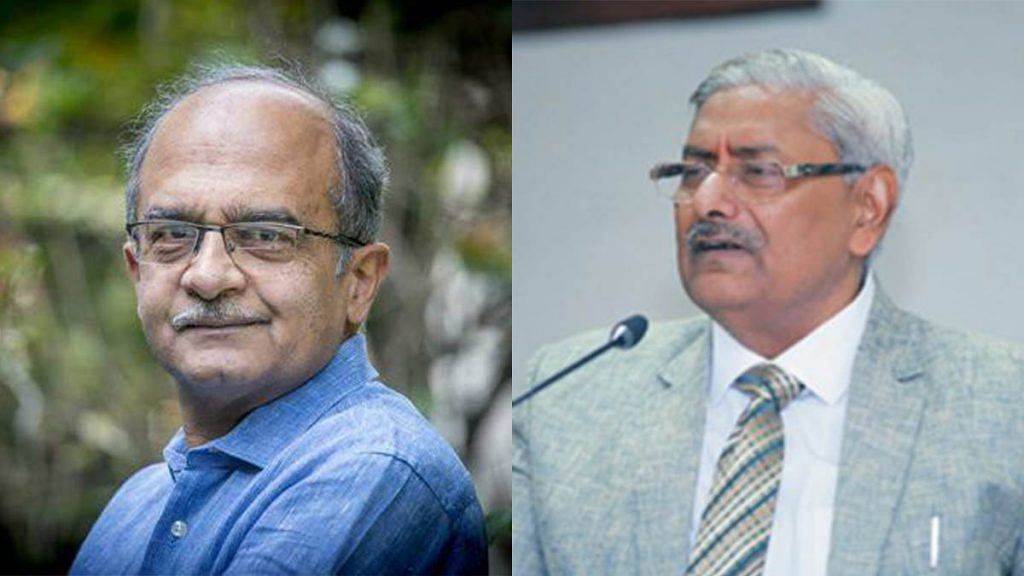New Delhi: Advocate-activist Prashant Bhushan filed a review petition before the Supreme Court Monday, asking it to reconsider his conviction for contempt over two tweets posted in June that raised questions about the current and four former chief justices of India (CJIs).
Bhushan has cited 12 grounds for his objections to the verdict, including the fact that the bench that delivered it was headed by Justice Arun Mishra who retired earlier this month.
“It is respectfully submitted that the judgment whose review is being sought suffers from multiple errors apparent on the face of the record of both law and of fact,” stated the petition, seeking an open-court hearing on the matter.
Supreme Court rules do not allow hearing of a review petition in open settings. The rules state a review petition “would ordinarily be entertained” without hearing oral arguments from lawyers. A review petition is heard and decided “through circulation” by judges in their chambers.
Bhushan was held guilty of contempt on 14 August and asked to pay a token Re 1 fine, which he deposited Monday.
The bench in question had proceeded suo motu to enlarge the scope of the case after advocate Mahek Maheshwari moved the court seeking contempt action against Bhushan for his tweet on CJI Bobde astride a Harley Davidson. The bench subsequently included another tweet, where Bhushan commented on four former CJIs, into the case.
Also Read: Arun Mishra — SC judge who backed Bar-Bench cordiality, but was part of bitter confrontations
Bhushan’s objection to Justice Mishra’s presence on bench
In his review plea, Bhushan has assailed the verdict on multiple grounds. For one, he said, Justice Mishra should not have led the bench.
According to Bhushan, Justice Mishra has, in the past, orally accused him of committing contempt of court when he merely mentioned that it may be inappropriate for a particular judge to hear a case in circumstances where conflict of interest was involved.
According to the lawyer, he had had “reasonable apprehensions” about not getting a fair hearing in the matter and had, therefore, written to CJI S.A. Bodbe asking him to change the bench’s composition.
Absence of the attorney general’s consent to initiate contempt proceedings, non-supply of Maheshwari’s complaint to Bhushan, and refusing truth as defence are among the other grounds cited by the lawyer.
Bhushan has already filed a writ petition before the top court to frame rules and guidelines providing for intra-court appeal against conviction for contempt by the Supreme Court. Such a hearing, he has contended, should be before a larger and different bench.
Why Bhushan wants open-court hearing
A review against a judgment is maintainable on the ground of an “error apparent on the face of the record”, which can comprise “mistake of law or fact”.
Explaining his demand for an open hearing, Bhushan said, “contrary to the fundamental precepts of the rule of law and natural justice, in an adversarial legal system, the top court sits as judge, investigator and prosecutor in determining the punishment and penalty on an alleged contemnor”.
“In view of the fact that contempt proceedings, by definition, involve the court sitting as prosecutor and judge, public confidence and the appearance of open and impartial justice cannot be served except by the admission and open hearing of review petitions which impugn convictions and/or sentences in cases of contempt,” submitted the petition.
Secondly, the court adopts a summary process in contempt cases, where procedural protections — available under constitutional provisions during trial (and otherwise) as part of an accused person’s rights — are dispensed with.
The court proceeds on a footing of a very broad discretion in the matter of sentencing, otherwise unknown to legal systems operating under the rule of law, he said.
He also noted that the term “scandalizing” the court — as stated under the law – is not clearly defined, and has “unspecified ingredients and boundaries”.
Bhushan said his right to remedy against a trial that violates due process of a fair hearing is drastically curtailed by the absence of a remedy to challenge conviction.
Also Read: Analyse my judgments but don’t give colour, says retiring Supreme Court Justice Arun Mishra
‘Judgment makes any and all criticism of SC contempt’
Bhushan has said the judgment has the effect of making the most “innocuous critiques of the institutional role of the Supreme Court”, including how it is administered, an offence of criminal contempt.
“The role played by the highest constitutional court of the country and the impact it has on the functioning of the democracy is something that is regularly commented upon by lawyers, authors, newspaper editorials, intellectuals, national and international media, etc,” he said.
While the bench was hearing his matter, several articles, editorials and commentaries appeared in the media that would be construed as contempt by the “novel standard set” by the court in the impugned judgment, he said.
According to Bhushan’s explanation, his second tweet — commenting on former CJIs — is part of academic debate and discussion worldwide.
“The impugned decision will have a very serious chilling effect on any discussion relating to this Hon’ble Court,” he said.
Also Read: Unity is not conformity — India should know that as Prashant Bhushan is convicted for contempt
